12 start with L start with L
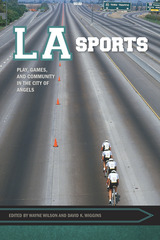
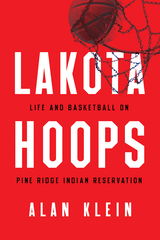
In Lakota Hoops, anthropologist Alan Klein trains his experienced eye on the ways that Lakota traditions find a seamless expression in the sport. In a variety of way such as weaving time-honored religious practices into the game or extending the warrior spirit of Crazy Horse to the players on the court, basketball has become a preferred way of finding continuity with the past. But the game is also well suited to the present and has become the largest regular gathering for all Lakota, promoting national pride as well as a venue for the community to creatively and aggressively confront white bigotry when needed.
Richly researched and filled with interviews with Pine Ridge residents, including both male and female players, Lakota Hoops offers a compelling look at the highs and lows of a community that has made basketball its own.

Sport is deeply embedded in human nature and culture, and it is central to human well-being. Outdoor sport and physical exercise have had considerable impact on how we design, live in, and understand landscapes. Landscapes and environments have, in turn, contributed to the formation and development of new sport activities as well as cultures of movement and the body. How have perceptions and politics of the body played a role in the evolution of different landscapes for sport? What do they tell us about their inherent culture and use, and how do landscapes for sport embody constructions of race, gender, and place? What are the interrelationships between more and less agonistic sport and body cultures, their politics, and the sites and spaces that accommodate them?
Landscapes for Sport explores these intersections from multiple perspectives in different parts of the world. They focus on outdoor spaces that have been designed, built, and used for physical exercise and various competitive and non-competitive sports since the early modern period. Frequently overlooked and taken for granted, these landscapes for sport often constitute significant areas of open space in and outside our cities. This volume uncovers their relevance and meanings.
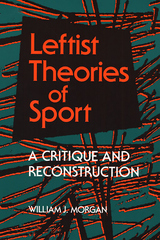
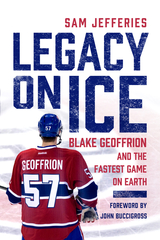
With sure-footed and swift-moving prose, Sam Jefferies tells Geoffrion’s story against the backdrop of modern North American hockey. Thorough research and scores of interviews fuel this tale of soaring success and terrible tragedy, offering insight not only into one man’s athletic journey but also into the rise of American hockey on the national and international stage. Geoffrion’s brief career, marked by tribulation and triumph, illustrates the subtle but omnipresent currents of American media, sports labor, and the interplay between college and professional athletics. It tells the story of what was, what is, and what may yet be for the fastest game on earth.
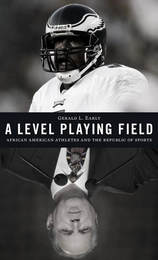
As Americans, we believe there ought to be a level playing field for everyone. Even if we don’t expect to finish first, we do expect a fair start. Only in sports have African Americans actually found that elusive level ground. But at the same time, black players offer an ironic perspective on the athlete-hero, for they represent a group historically held to be without social honor.
In his first new collection of sports essays since Tuxedo Junction (1989), the noted cultural critic Gerald Early investigates these contradictions as they play out in the sports world and in our deeper attitudes toward the athletes we glorify. Early addresses a half-century of heated cultural issues ranging from integration to the use of performance-enhancing drugs. Writing about Jackie Robinson and Curt Flood, he reconstructs pivotal moments in their lives and explains how the culture, politics, and economics of sport turned with them. Taking on the subtexts, racial and otherwise, of the controversy over remarks Rush Limbaugh made about quarterback Donovan McNabb, Early restores the political consequence to an event most commentators at the time approached with predictable bluster.
The essays in this book circle around two perennial questions: What other, invisible contests unfold when we watch a sporting event? What desires and anxieties are encoded in our worship of (or disdain for) high-performance athletes?
These essays are based on the Alain Locke lectures at Harvard University’s Du Bois Institute.
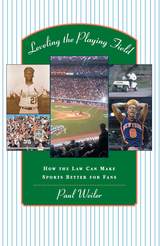
The world of sports seems entwined with lawsuits. This is so, Paul Weiler explains, because of two characteristics intrinsic to all competitive sports. First, sporting contests lose their drama if the competition becomes too lopsided. Second, the winning athletes and teams usually take the "lion's share" of both fan attention and spending. So interest in second-rate teams and in second-rate leagues rapidly wanes, leaving one dominant league with monopoly power.
The ideal of evenly balanced sporting contests is continually challenged by economic, social, and technological forces. Consequently, Weiler argues, the law is essential to level the playing field for players, owners, and ultimately fans and taxpayers. For example, he shows why players' use of performance-enhancing drugs, even legal ones, should be treated as a more serious offense than, say, use of cocaine. He also explains why proposals to break up dominant leagues and create new ones will not work, and thus why both union representation of players and legal protection for fans--and taxpayers--are necessary.
Using well-known incidents--and supplying little-known facts--Weiler analyzes a wide array of moral and economic issues that arise in all competitive sports. He tells us, for example, how Commissioner Bud Selig should respond to Pete Rose's quest for admission to the Hall of Fame; what kind of settlement will allow baseball players and owners to avoid a replay of their past labor battles; and how our political leaders should address the recent wave of taxpayer-built stadiums.
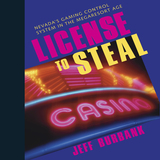
These seven precedent-setting case studies taken from the files of the Nevada Gaming Control Board and Commission illustrate vital issues addressed in the first decade of Las Vegas' megaresorts.
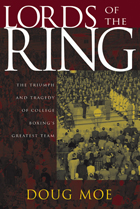
Under legendary and beloved coach John Walsh, the most successful coach in the history of American collegiate boxing, University of Wisconsin boxers won eight NCAA team championships and thirty-eight individual titles from 1933 to 1960. Badger boxers included heroes like Woody Swancutt, who later helped initiate the Strategic Air Command, and rogues like Sidney Korshak, later the most feared mob attorney in the United States. A young fighter from Louisville named Cassius Clay also boxed in the Wisconsin Field House during this dazzling era.
But in April 1960, collegiate boxing was forever changed when Charlie Mohr— Wisconsin’s finest and most popular boxer, an Olympic team prospect—slipped into a coma after an NCAA tournament bout in Madison. Suddenly, not just Mohr’s life but the entire sport of college boxing was in peril. It was to be the last NCAA boxing tournament ever held. Lords of the Ring tells the whole extraordinary story of boxing at the University of Wisconsin, based on dozens of interviews and extensive examination of newspaper microfilm, boxing records and memorabilia.
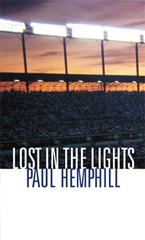
A veteran journalist’s collection of sportswriting on the blue-collar South.
Sport mirrors life. Or, in Paul Hemphill's opinion, “Sport is life.” The 15 pieces in this compelling collection are arranged along the timeline for an aspiring athlete's dream: “The Dawning,” with stories about boys hoping and trying to become men, “The Striving,” about athletes at work, defining themselves through their play, and “The Gloaming,” about the twilight time when athletes contend with broken dreams and fading powers. Through all the pieces, Hemphill exhibits his passion for the sports he covers and a keen eye for the dramas, details, and hopes that fire the lives of athletes, allowing them to become prototypes of all human existence.
Most of the stories have been previously published in such national magazines as Sports Illustrated, True, Life, Today’s Health, and Sport. In “White Bread and Baseball,” the author chronicles his own boyhood infatuation with the minor-league Birmingham Barons, while in “Yesterday’s Hero” he details the sad end of a former All-American football player named Bob Suffridge, a portrait of a lion in winter. “It’s a Mad, Mad, Mad Whirl” covers nights on the road with the roller derby, and “Saturday Night at Dixie Speedway” captures all the raucous glory of a stock-car dirt track under the hot lights. “Big Night, Big City” tells of an anxious, small-town high school basketball team facing their crucial chance for glory at a state tournament in Atlanta, and the classic “Mister Cobb” details a personal lesson on sliding the young author received from “the greatest player in the history of baseball.”
These stories are often bittersweet, emotional, and mythic: little dramas bearing impact and psychological “size.” Some of them are distinctively “Dixie,” but they ultimately transcend time and place. Frye Gaillard, author of Kyle at 200 MPH: A Sizzling Season in the Petty-NASCAR Dynasty, writes, “For more than 30 years, Paul Hemphill has been one of the finest writers in the South, and I think he proves it again in this collection. He exudes a natural feel for the players and the game, drawing out the real-life themes of struggle and desire, occasional triumph, and the omnipresent possibilities of heartache and failure.”
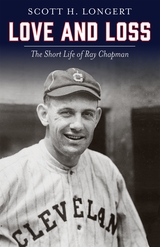
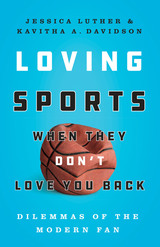
Triumphant wins, gut-wrenching losses, last-second shots, underdogs, competition, and loyalty—it’s fun to be a fan. But when a football player takes a hit to the head after yet another study has warned of the dangers of CTE, or when a team whose mascot was born in an era of racism and bigotry takes the field, or when a relief pitcher accused of domestic violence saves the game, how is one to cheer? Welcome to the club for sports fans who care too much.
In Loving Sports When They Don’t Love You Back, acclaimed sports writers Jessica Luther and Kavitha A. Davidson tackle the most pressing issues in sports, why they matter, and how we can do better. For the authors, “sticking to sports” is not an option—not when our taxes are paying for the stadiums, and college athletes aren’t getting paid at all. But simply quitting a favorite team won’t change corrupt and deplorable practices, and the root causes of many of these problems are endemic in our wider society. An essential read for modern fans, Loving Sports When They Don’t Love You Back challenges the status quo and explores how we might begin to reconcile our conscience with our fandom.
READERS
Browse our collection.
PUBLISHERS
See BiblioVault's publisher services.
STUDENT SERVICES
Files for college accessibility offices.
UChicago Accessibility Resources
home | accessibility | search | about | contact us
BiblioVault ® 2001 - 2024
The University of Chicago Press









